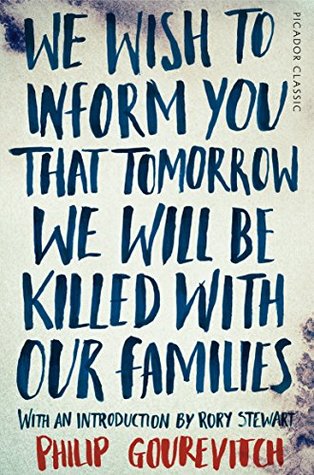More on this book
Community
Kindle Notes & Highlights
There were four thousand Tutsis killed here at Kacyiru”—a neighborhood of Kigali. “The soldiers brought them here, and told them to sit down because they were going to throw grenades. And they sat.
We wish to inform you that we have heard that tomorrow we will be killed with our families.
Tribalism begets tribalism. Belgium itself was a nation divided along “ethnic” lines, in which the Francophone Walloon minority had for centuries dominated the Flemish majority. But following a long “social revolution,” Belgium had entered an age of greater demographic equality. The Flemish priests who began to turn up in Rwanda after World War II identified with the Hutus and encouraged their aspirations for political change.
Power is terribly complex; if powerful people believe in demons it may be best not to laugh at them.
Genocide, after all, is an exercise in community building.
Killing Tutsis was a political tradition in postcolonial Rwanda; it brought people together.
Dallaire labeled his fax “most immediate,” and signed off in French: “Peux ce que veux. Allons’y” (“Where there’s a will, there’s a way. Let’s go”). The response from New York was: Let’s not.
After months, during which Rwandans had been left to wonder whether the UN troops knew how to shoot, because they never used their excellent weapons to stop the extermination of civilians, it turned out that the peacekeepers were very good shots.
Rwanda is landlocked and dirt-poor, a bit larger than Vermont and a bit less populous than Chicago, a place so dwarfed by neighboring Congo, Uganda, and Tanzania that for the sake of legibility its name has to be printed on most maps outside the lines of its frontiers. As far as the political, military, and economic interests of the world’s powers go, it might as well be Mars. In fact, Mars is probably of greater strategic concern. But Rwanda, unlike Mars, is populated by human beings, and when Rwanda had a genocide, the world’s powers left Rwanda to it.
“If it bleeds, it leads,” the old newsroom saw has it, and in Rwanda the blood was beginning to dry. The story was in Goma, and it was no longer just a sad, confusing, ugly African story. It was our story, too—the whole world was there to save the Africans from their sad, confusing, ugly story.
A reporter who was sent into Goma directly from Bosnia told me that he knew what Hutu Power was and that he looked up at the volcano and prayed, “God, if that thing erupts right now, and buries the killers, I will believe that you are just and I will go to church again every day of my life.”
“We live in the flicker—may it last as long as the old earth keeps rolling! But darkness was here yesterday.”
N and 1 other person liked this
What distinguishes genocide from murder, and even from acts of political murder that claim as many victims, is the intent. The crime is wanting to make a people extinct. The idea is the crime. No wonder it’s so difficult to picture. To do so you must accept the principle of the exterminator, and see not people but a people.


